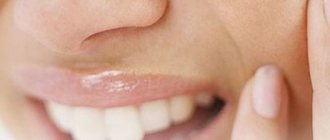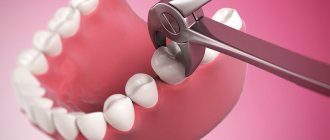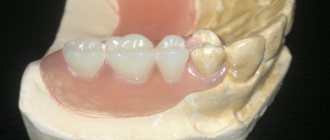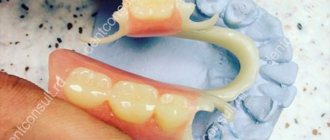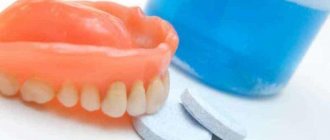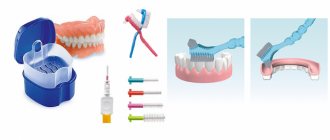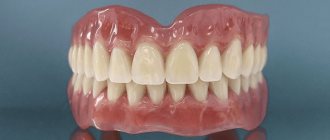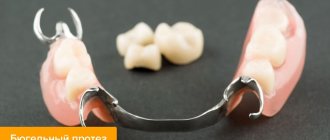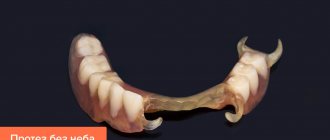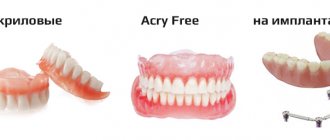- Advantages and disadvantages
- Kinds
- Indications
- Stages of treatment
- Care
- Alternative Methods
- Advantages of the ROOTT Clinic
- Prices
- Work examples
- Doctors
- Reviews
Losing teeth often leads to a decrease in self-esteem: people try to talk less, smile less often, and do everything not to attract attention to themselves. Orthopedists are developing different methods to restore quality of life. One such method is acrylic dental prosthesis.
- When used:
missing from 1 tooth to completely edentulous - Type of anesthesia:
no need - Procedure time:
from 30 minutes (up to 4 visits) - Treatment period:
from 1.5 weeks to 3 weeks - Healing period:
from 3 weeks after the last removal - Age restrictions:
from 18 years old (in our clinic)
Acrylic has been used as a material for prosthetics for many decades and it still remains the most popular. Several factors influence this.
Pros and cons of acrylic prosthesis
There are no perfect methods for restoring teeth. Each case must be considered individually. The orthopedist takes into account all anatomical and physiological features before deciding on a specific prosthetic method. It should be noted that acrylic dentures have disadvantages. The main one is related to the composition: during production, a monomer (methacrylic acid ester) is used, which reacts with mucosal proteins, causing allergic reactions in a certain percentage of patients. These reactions can be local (allergic contact dermatitis, allergic stomatitis) and general, up to angioedema.
Advantages
- Availability - prices for acrylic prostheses are lower than for structures made from other materials;
- wear resistance - acrylic is hard, products made from it can last up to 8-9 years;
- resistance to chemical influences - sour, sweet, salty - acrylic calmly reacts to chemical irritants, does not change color or shape;
- weight - plastic - the material is light, the patient does not feel much pressure on the teeth, after a period of adaptation the denture does not interfere in the mouth;
- ease of manufacture - production technologies are well developed, products can be manufactured in any laboratory;
- ability to be modified - the properties of acrylic allow you to choose any shape, shade and size of the product;
- ease of installation - the prosthesis is installed in 2-3 visits;
- inexpensive repair.
Flaws
- Porosity of the material - during production, micropores appear in plastic, and this is an opportunity for bacteria to accumulate and cause infections;
- insufficient resistance to variable loads during chewing - despite wear resistance, the structure may break under load, but it can be easily repaired;
- low elasticity - in unusual cases, such as growths on the jaw (exostoses), sharp bone protrusions, increased pain sensitivity, acrylic dentures can cause severe discomfort;
- progressive atrophy of bone tissue - only implantation can slow down bone loss, in other cases it will increase.
Flaws
Despite the large number of advantages, acrylic dentures have disadvantages, about which the specialists at President Dentistry warn their patients in advance:
- Acrylic teeth are less aesthetically pleasing than ceramic teeth.
- Acrylic base is not as durable as metal base.
- Plastic is susceptible to chips, which, however, can be restored.
- Insufficient load on the jaw bone, as a result of which it gradually atrophies.
- The service life of the product is 5 years; subsequently, adjustments or the manufacture of a new design are required.
It is worth pointing out that insufficient oral hygiene over time will lead to darkening of the teeth, the appearance of plaque and unsightly stains on them.
Types of products
Acrylic products are used in dentistry if all or part of teeth are missing. Therefore, it is customary to divide dentures into:
- Full.
Used in cases of complete absence of teeth. - Partial.
An acrylic partial denture is placed when there are teeth that can be used as support. - Butterfly.
It is attached to adjacent teeth, so it is used only when 1-2 teeth are missing.
Depending on the wearing time, the designs can be:
- temporary;
- permanent.
Temporary dentures are used while permanent ones are being made or while implants are taking root. When using basal implantation methods, All-on-4, All-on-6 methods, such systems are made non-removable.
Production Features
Production technology – injection molding. The material is placed into a closed mold through a special channel. This approach allows you to completely eliminate deformation and the formation of poorly filled areas. Before starting casting, a specialist selects the shape, size and color of the base part. This does not require frequent visits to the dentist; two visits are enough:
- The first visit - a visual examination and assessment of the dental system is carried out, impressions are taken for sending to the dental laboratory.
- The second technique is to try on the finished model, teach the rules of use, and make corrections when fitting.
About a week will pass between the first and second appointments. This period is quite enough for our technicians to produce a good acrylic prosthesis.
Who is suitable for acrylic dentures?
First of all, to those who do not have allergic reactions to it. This is the main condition and should be discussed with your doctor before making a choice.
Acrylic dentures are suitable for:
- complete edentia;
- partial edentia;
- the impossibility of using other methods of dentition restoration;
- temporary prosthetics.
The method has contraindications:
- in the development of allergic reactions
. The risk group includes patients with bronchial asthma, food allergies, reactions to medications, and problems with the endocrine system. - The anatomical features
of the oral cavity do not always allow the installation of a structure made of hard plastic. For example, with a sharp, thin or overhanging alveolar ridge, such a prosthesis will be impossible to wear.
Price
| Included in the price |
|
| Paid separately |
|
| Affect the cost |
|
Stages of manufacturing and prosthetics
The dentist begins the procedure with an initial examination. It determines the scope of work and the need for preliminary manipulations. The oral cavity is sanitized before prosthetics; if necessary, damaged teeth are removed. Crowns are placed on those that are intact according to indications.
- Upon completion of the preparatory stage, the doctor takes impressions of both jaws, even if a removable acrylic denture is intended for only one jaw.
- In the laboratory, a plaster model is made from casts
- After this, the technician forms a wax model and sends it for fitting.
- The orthopedist performs a fitting in the patient's mouth, notes any imperfections, and returns the model back to the laboratory for adjustments.
- A plastic prosthesis is made based on the wax model.
- The finished product is ground, polished and sent to an orthopedist
- The doctor installs the structure and provides instructions on use and care.
A complete acrylic denture on the upper jaw holds up better. Due to the hard palate, the suction effect is higher. Typically, such products do not require additional funds. There is not enough space on the lower jaw for a foundation; for better fixation, you need to use a special cream.
Partial dentures are held in place by special anchors in both the lower and upper jaws. The main condition is the presence of supporting teeth.
Danger of allergic reactions
A certain group of users may be allergic to one of the free monomers that is a component of acrylic. The reaction will not go away on its own, because these components are constantly released from the plastic during wear.
Signs of allergies:
- a burning sensation occurs
- dysfunction of taste buds (incorrect taste perception)
- decreased salivation (constant dry mouth)
- excessive salivation
- inflammation of soft tissues (tongue, gums, mucous membranes)
These examples are rare, but if symptoms occur, you should immediately stop wearing an acrylic prosthesis. As an alternative, it is recommended to install nylon or silicone that does not contain acrylic.
How to care for a removable acrylic denture on the jaw
If the prosthesis is fixed, on implants, then it is cared for in the same way as your own teeth. It is enough to carry out hygiene procedures regularly. No additional manipulations are required.
If the product is removable, it is recommended:
- remove and rinse the jaw in running water after each meal;
- use a waterpik to get rid of stuck crumbs;
- Brush your remaining teeth regularly. If there are no teeth, wipe the gums with mouthwash;
- when using a fixative cream, rinse your mouth thoroughly after eating;
- clean the product with a soft toothbrush and regular low-abrasive paste;
- regularly disinfect jaws with special tablets or use sterilizers.
During adaptation, orthopedists recommend wearing the prosthesis around the clock. It can then be removed at night. Store the system in boiled water or a special liquid from a pharmacy. If necessary, you can simply wrap it in a napkin. Modern materials do not dry out in the air, but it is better to consult a doctor on how exactly to store an artificial jaw.
According to patient reviews, putting on the prosthesis “dry” is not very convenient, but you can get it wet if you do not use a retainer. The cream is applied only to a dry surface.
How can I replace acrylic?
If you have allergies, don't worry. Prostheses made of acrylic plastic can be replaced with nylon products. They are softer, more elastic, and easier to get used to.
But they also have drawbacks. Such products distribute the chewing load unevenly, increasing it at the bite site. They are prone to deformation. There are no ideal materials; before choosing, you need to consider all the pros and cons.
| Property | Acrylic | Nylon |
| Possibility of allergic reactions | Eat | No |
| Price | Relatively low | Relatively high |
| Presence of metals | Yes, in partial dentures | No |
| Elasticity | Low | High |
| Probability of fault | High | Low |
| Weight | Easy | Easy |
| Fixation | good | Worse than acrylic |
| Possibility of repair | Eat | No |
| Aesthetics | Average | High |
| Risk of loosening of supporting teeth | High | Short |
| Terms of adaptation | For a long time | Fast |
What is better - nylon prostheses or acrylic ones, the doctor decides in each specific case, taking into account the wishes of the patient.
The new AcryFree material is a compromise between nylon and acrylic. It does not contain monomers and does not cause allergic reactions. In this case, the systems:
- Moderately hard.
Softer than acrylic, but hard enough to distribute the load evenly. - Comfortable.
The AcryFree base is thin; the partition on the upper jaw does not block the taste buds. - Easily fixed.
More flexible than acrylic ones, such dentures adhere well and do not rub the gums. - They have a natural look.
Clasps (clasps) are made from the same material, and the base itself imitates natural fabric, so the prosthesis is hardly noticeable.
Like acrylic systems, AcryFree systems have a rather long period of adaptation. You need to take care of them very carefully, they are more fragile than nylon.
Dental implantation A reliable and durable method to restore a smile in the absence of teeth
Nylon dentures An elastic and damage-resistant denture is attached by suction to the gum or using clasps to the supporting teeth
AcryFree dentures Comfortable and elastic systems, do not deform under chewing loads, maintaining aesthetics; do not cause allergies
The most advanced method of dental reconstruction is implantation. Thanks to it, you can restore any number of teeth. Implants stop bone loss. They are as close as possible to natural teeth in function and appearance.
Article Expert
Shirokov Ivan Yurievich Dentist-orthopedist, doctor of the highest category
Work experience: more than 17 years
Reviews from our patients
Vladislav Topalov
I want to share a miracle with you. Yes Yes. MIRACLE. In 2022 I had my wisdom tooth removed. If anyone remembers, I wrote about it. Then I had to remove 3 more... and, as always happens, I gave up on it... a year and a half passed and I was told, as in the case of the first one, that I urgently needed to remove another one. And I decided that I was not ready to remove 3 more, one every year and a half. I called Kostya and asked him to delete 3 at once!!! Yes Yes! 3 at once! Under anesthesia. The operation was scheduled for 9.01. That is, yesterday. I’ll say it right away! Both then and now I PAID FOR EVERYTHING. I SHARE with YOU from the bottom of my heart, and not because they are doing something for me for free!!!! I, like 99% of us, am afraid of the dentist. I’m not afraid, of course, because I understand technology, anesthesia, etc.... but I'm afraid. Guys!!! I'M HAPPY! Yesterday, 3 teeth were removed in 15 minutes. Under sedation!!! I slept like a baby! Moreover - NOT A SINGLE SEAMLESS. Nothing hurts today. The face is NOT swollen. You can see it in the photo. I came today to see the doctor. If anyone needs to have their teeth removed - I PERSONALLY tell you - go to Konstantin Vladimirovich! He has GOLDEN hands!! Ahhh yes! I also DO NOT TAKE ANALGESICS!!! Yes, yes, you didn’t think so!!! He removed it so delicately that it doesn’t even hurt. Do you believe this? I'm not very... and all mine too. It is fantastic! Kostya, dear! God grant you health!!! Thank you so much!
Review on Instagram Read other reviews
Where to put
In Moscow, placing a removable acrylic denture on the jaw is not difficult. But making a system in a tiny laboratory is one thing, but making it in a modern one, equipped with the latest technology, is quite another. Shrinkage of acrylic plastics can reach 6-8% and only careful adherence to technology can reduce it to a minimum. A well-equipped laboratory is suitable for this, but a small one is not. Shrinkage determines how accurately the prosthesis “fits” on the jaw.
MCDI ROOTT has its own laboratory, orthodontists and laboratory assistants work in one team. New equipment and experienced doctors guarantee the quality of prostheses.
What is the price
The price depends on the amount of work and its complexity, but the RUTT clinic does everything to reduce the financial burden. The center offers the opportunity to pay for prosthetics in installments and take out a loan. You will be given documents for a tax deduction, and by subscribing to the newsletter, you will know about all promotions and discounts. Sign up on the website and get professional advice for free.
Free online consultation with a dentist
| Service | Price |
| Installation of a temporary cosmetic plate (butterfly) | from 11,000 rub. |
| Installation of a complete or partially removable lamellar denture (acrylic, 1 jaw) | from 32,000 rub. |
| Conditionally removable acrylic prosthesis on spherical attachments Rhein-83 for 1 jaw | from 121,000 rub. |
Consultation and diagnostics are free!
All prices Promotions
Why are complex teeth treated at PARTNER-MED?
We know how to work!
We have orthopedic dentists with 8-30 years of experience!
We love to work!
We will give you a free consultation and tell you exactly how best to make your teeth better!
